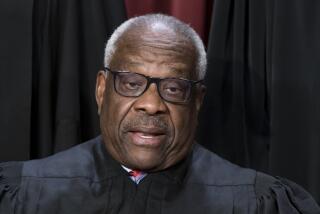Federal Judge Criticizes Simpson Verdict, Attorneys’ Book Deals
- Share via
A federal appeals court judge said Tuesday that the verdict in the O.J. Simpson murder trial was “astonishing,” and he decried the “bizarre and unseemly” rush of participants in the case to sell books about their experiences.
Judge Stephen Reinhardt of Los Angeles was particularly critical of the lucrative deals made by deputy district attorneys Marcia Clark and Christopher A. Darden, the lead prosecutors, who garnered $4.2 million and $1.3 million, respectively, for their as-told-to books.
“Perhaps the most mind-boggling aspect,” said Reinhardt, “was how two of the lawyers who lost a case that most people had thought could not possibly be lost, and who did so through the use of some of the most bizarre trial tactics employed in the history of American jurisprudence, not only obtained book and motion picture deals that will bring them more money than most lawyers make over their entire careers, but they also now command huge fees as lecturers. That on the basis of this trial they are held out as expert practitioners, role models and examples of dedicated public servants simply defies the imagination.”
Reinhardt, one of the most liberal federal judges in the nation, told an audience of judges and lawyers in Beverly Hills that public scorn about the Simpson case lawyers rubs off on all attorneys. The jurist--whose outspokenness is unusual among judges at his level--lamented the trial’s “most visible heritage”: “the deep racial divisiveness that it exposed and perpetuated.” And he expressed regret that the case had led to an “unfortunate effort to try to change the rules of the criminal justice system so as to limit the rights of defendants.”
Norman R. Brokaw, chairman and chief executive officer of the William Morris Agency, which represents Clark and Darden, took issue with Reinhardt’s remarks. “In the ‘trial of the century,’ one should be able to tell his or her own story,” Brokaw said. “I think Marcia Clark and Chris Darden did an extraordinary job. . . . Chris’ book is the most successful of the Simpson trial books so far,” Brokaw said, adding that he expects Clark’s book to come out late this year or early next year.
Reinhardt commented on the Simpson case in the course of a wide-ranging address at the annual Supreme Court luncheon of the Beverly Hills Bar Assn., which honors members of the California judiciary and raises funds for scholarships that the association endows at four local law schools, according to the organization’s president, Daniel G. McIntosh. All seven justices of the California Supreme Court were in attendance, as were numerous other judges.
During his speech, Reinhardt, 65, also deplored cuts in federal funding for poverty lawyers, criticized new restrictions on the right to appeal death penalty convictions, lashed out at “intemperate and inexcusable attacks on the independence of the judiciary” by President Clinton and Republican leaders and lamented the fact that several state Supreme Court justices retired early and took more lucrative jobs. He said these early retirements were a sign that some judges “seem to value our role less” and that this had contributed to a diminution in public esteem of the judiciary.
The justices of the California Supreme Court “hold an office that is one of the most important in our nation--judicial or otherwise,” Reinhardt said. “The entire country used to take its lead from the California Supreme Court. But in recent years we have seen Supreme Court justices who seem to be barely passing through the system on their way to better-paying jobs, either with private law firms or as rent-a-judges or arbitrators. It used to be that high-paid lawyers or successful arbitrators would give their eye teeth to be Supreme Court justices, not vice versa.”
Indeed, other than Stanley Mosk, the state Supreme Court’s senior justice who was appointed in 1964, there has been a complete turnover in the seven-member court since 1989.
In addition to criticizing recent attacks on federal judges, Reinhardt also expressed concern about state court judges who must stand for reelection. He said it had become so difficult for such judges to make unpopular rulings--particularly in criminal cases--that “the time may well have come to extend the protection of life tenure to state court judges.” He stressed that one benefit of such a system “is that judges would no longer have to solicit campaign contributions from attorneys or their law firms.”
Ron George, California chief justice, said he favored some changes in California’s current judicial election system. But he said he would not prefer the federal system, with its political confirmation hearings. He said he favored legislation now pending in Sacramento that would give voters more information about judges on the ballot.
More to Read
Get the L.A. Times Politics newsletter
Deeply reported insights into legislation, politics and policy from Sacramento, Washington and beyond. In your inbox twice per week.
You may occasionally receive promotional content from the Los Angeles Times.









